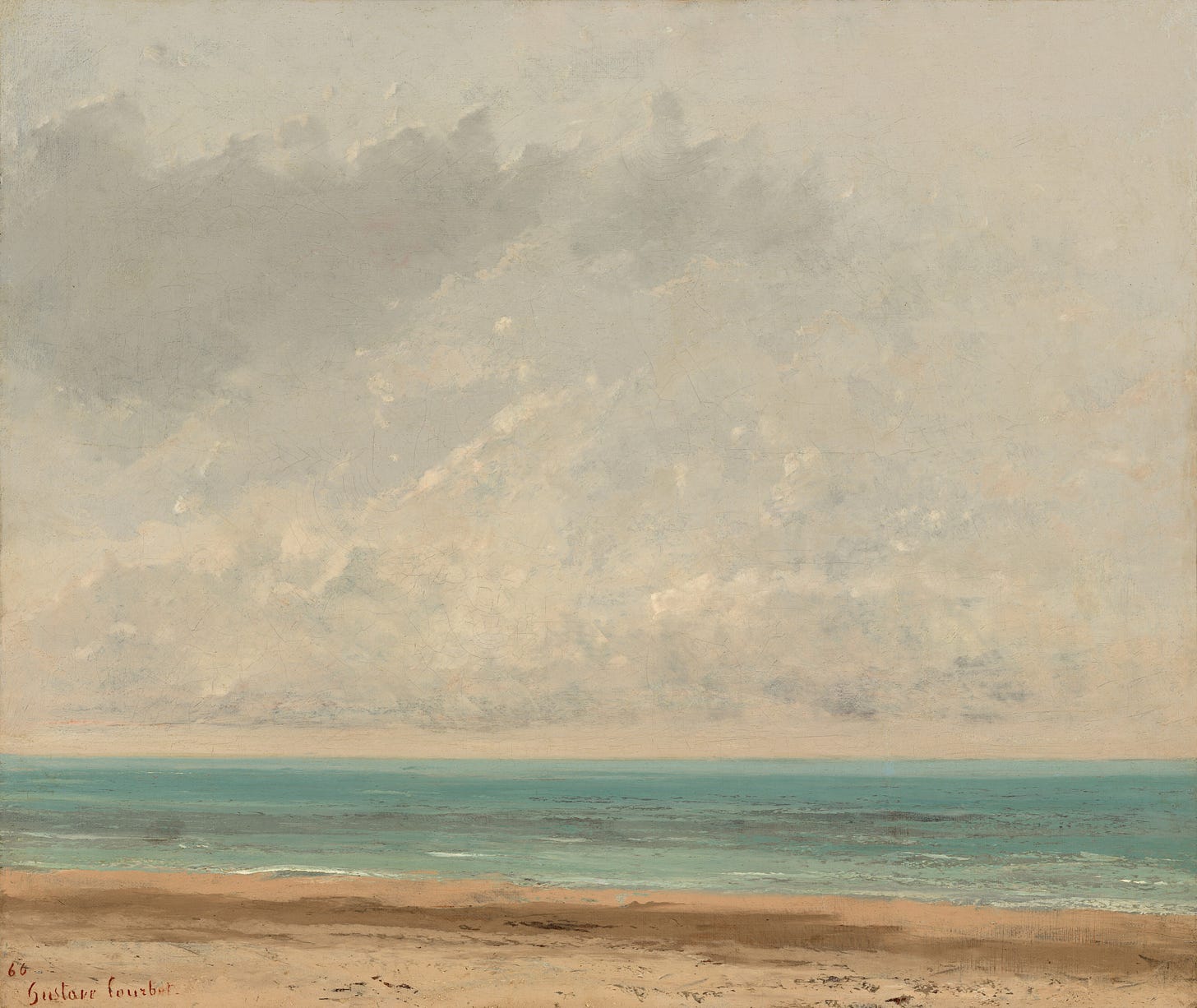[Image: “Calm Sea,” Gustave Courbet, 1866, courtesy of National Gallery of Art Open Access Collection, public domain]
Welcome, new folks. You’ll notice right away that this publication doesn’t publish on anything like the recommended schedule. I hope you’ll find the Rilke-esque pace congenial. We’re here to contemplate reality together, after all.
Yet don’t let the subtitle frighten you. This is not about to become yet another complaint—although I could register one or two (thousand)—about the flattening and reduction of all our experiences by means of their filtering through screen culture. That has been done about as well as it can be done; I’ve read the essay and so have you.
Besides, you’ve heard it here before too. If we want to avoid the “raging post-truth unreality” of our time, if we want to sail well through waters where “technological innovations … promise to provide clear windows but instead function as unreal filters, distorting the mind’s rapprochement with reality,” we can’t do better than cast a skeptical eye on the backwaters where the unreal filters lurk.
Still: This place where the problems coalesce shares an ecosystem with the very place where we meet each other. This place is not (or not entirely) a toxic ocean, as has been suggested. Instead it is, I think, a dark wood—a place where we may, yes, meet wicked things, but possibly also helpers.
[Image: “Dante Flees the Wild Beasts and Meets Virgil,” Bartolomeo Pinelli, 1824, courtesy of National Gallery of Art Open Access Collection, public domain]
As my friend Paul Pastor is saying over at The Rose Fire (and yes, Paul, this juxtaposition does implictly low-key identify you as a Virgilian figure)—there does seem to be right now a need to resist, to swim against the current: perhaps all the more when the waters appear calm.
There does seem to be spiritual undertow, a force that hungers to pull us down below the surface—not into depths of wonder, where we might well desire to go, but into depths that mean us harm, that seek to drown us for the furtherance of their own ignorant and/or malicious ends.
In our time there is a kind of long stare that we must cultivate and a kind of long stare that we must avoid. Both kinds will tend to empty us of self, but one will only drain away ego; the other will leave us hulled like oysters and, like oysters, consumed. Both will ask us to spend ourselves, but only one will in the very same act restore us, refill us with something better worth having.
We must learn to tell the difference between when we are emptying ourselves out in a kenotic sense, in a way that might be beneficial—pouring into a greater well, flowing into a greater source—and when we are simply emptying out—spilling, wasting—in a destructive, draining, and yes I want to say vampiric mode. To yield to this latter mode is to align ourselves with the hungry thing in the dark that wants to eat our attention and, therefore, our love.
We mustn’t align ourselves with this thing, however we might name it, whatever it may be.
It seems to me that the writer who aspires to the contemplative-realist aesthetic and ethic, who aspires to store up a sense of “not what everyone sees, but what not everyone sees,” needs to cultivate the better kind of outward turn, which I want to name “active receptivity.”
And, beyond this, along with this, two more things: one, an utterly non-reactive attitude toward the surface churn of culture; two, a sort of buoyancy, an ability to float, to ride the waves.
How are we to do all this? Any of this? It is simple to say, not so simple to do, as you know if you’ve tried, even for a day or two.
So far I have only one suggestion, which I have been working to practice these past months. When you don’t hear from me, this is what I am trying to remember:
Some experiences were never meant to become content, as in fodder for the digital maw. They were meant to content us: to fill us, to satisfy us, so that we might in turn have something worth giving.
That’s it, the point, the whole essay. Now go experience something.
Don’t be content; be content.






Yes.
One place and discipline I’ve recently become acquainted with is centering prayer. It to have a specific power to (among other things) empty in the kenotic sense. The Simone Weil renunciation sense. So when I am moving with my body through the days, it is informed in a non-cognitive way by this pre-giving-up-in-a-good-sense. Not sure if this makes sense, but thought I’d share.
Thanks for this. I love Rilke.
“Some experiences were never meant to become content, as in fodder for the digital maw. They were meant to content us: to fill us, to satisfy us, so that we might in turn have something worth giving.”
Thank you for the perfect thought to exhort me to attention during a vacation week at the lake…. To avoid the temptation of “mining” experience for writing…